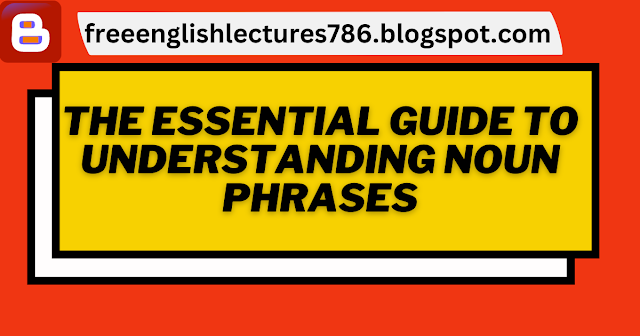Noun Phrase
Are you familiar with the concept of "Noun Phrase"? It's a fundamental concept in English grammar that is often overlooked, yet it plays a crucial role in forming coherent sentences. In this blog post, we'll delve into the details of noun phrases, their importance, and how to use them effectively.
In short, a noun phrase is a group of words acting as nouns in a sentence. It can consist of a noun and its modifiers, determiners, and complements. Noun phrases are crucial in creating well-structured sentences; mastering them can significantly enhance your writing skills.
If you're still unsure about the significance of noun phrases, let's take the example of Ernest Hemingway's writing style. Hemingway was known for his concise, straightforward writing style that utilized noun phrases to significant effect. In his famous short story, "Hills Like White Elephants," Hemingway's use of noun phrases creates a sense of economy and efficiency that perfectly captures the story's essence.
But what makes a good noun phrase? And how can you use them effectively in your writing? In this article, we'll explore the ins and outs of noun phrases and provide practical tips for incorporating them into your report. So, let's dive in and explore the world of noun phrases!
Outline
I. Introduction
• Definition of a noun phrase
• Importance of understanding noun phrases
II. Components of a Noun Phrase
• Head noun
• Modifiers (adjectives)
• Determiners (articles and demonstratives)
• Prepositional phrases as modifiers
• Examples of how they work together
III. Types of Noun Phrases
• Basic Noun Phrases
• Compound Noun Phrases
• Pronominal Noun Phrases
• Gerund Noun Phrases
• Infinitive Noun Phrases
IV. Functions of Noun Phrases
• Subject
• Object
• Complement
• Appositive
• Modifier
V. Common Errors with Noun Phrases
• Dangling Modifiers
• Misplaced Modifiers
• Unclear Referents
VI. Noun Phrases in Context
• Real-life examples of noun phrases in use
• Why it is essential to master noun phrases in language learning
VII. Conclusion
• Recap of the importance of noun phrases
• Final thoughts and takeaways
Introduction
A noun phrase is a group of words that work together to name and describe a person, place, thing, or idea. It is an essential element of any sentence in English, and mastering it can improve your writing and communication skills. In this blog post, we will define a noun phrase and discuss its components, types, functions, standard errors, and examples of how it works in context.
What is a Noun Phrase?
A noun phrase consists of a head noun and other words that modify, describe, or specify the noun. The head noun is the central element of the words, and the modifiers provide additional information about the noun. Determiners, such as articles and demonstratives, are also part of the noun phrase and help identify the noun's function in the sentence.
Components of a Noun Phrase:
The main components of a noun phrase include:
1. Head Noun: The central element of the phrase that names the person, place, thing, or idea.
2. Modifiers: Words that describe or give more information about the head noun, such as adjectives or prepositional phrases.
3. Determiners: Words before the noun, such as articles (a, an, the) or demonstratives (this, that), help identify the noun's function.
Types of Noun Phrases:
There are several types of noun phrases, including:
1. Basic Noun Phrases: Consist of only a head noun and determiner.
2. Compound Noun Phrases: Consist of two or more nouns joined together by a conjunction or a preposition.
3. Pronominal Noun Phrases: Use pronouns instead of nouns.
4. Gerund Noun Phrases: Use gerunds (verbs ending in -ing) as the head noun.
5. Infinitive Noun Phrases: Use infinitives (to + verb) as the head noun.
Functions of Noun Phrases:
Noun phrases have various roles in a sentence, including:
1. Subject: The noun phrase that tells what or who is doing the action in the sentence.
2. Object: The noun phrase that receives the verb's action in the sentence.
3. Complement The noun phrase that completes the sentence's meaning, such as a predicate noun or adjective.
4. Appositive: A noun phrase that renames or explains the noun immediately preceding it.
5. Modifier: A noun phrase that modifies another noun phrase in the sentence.
Common Errors with Noun Phrases:
Some common error with noun phrases are included:
:
1. Dangling Modifiers: Modifiers that don't have a clear referent in the sentence.
2. Misplaced Modifiers: Modifiers placed too far away from the noun they modify.
Noun Phrases in Context: To understand how noun phrases work in context, let's look at some examples:
1. "The red car drove down the street": In this sentence, "the red car" is the subject noun phrase. It consists of the head noun "car," the modifier "red," and the determiner "the."
2. "I saw a dog chasing its tail": In this sentence, "a dog" is the object noun phrase. It comprises the head noun "dog" and the determiner "a."
3. "My favorite hobby is reading books": In this sentence, "reading books" is the complement noun phrase. It consists of the head noun "reading" (a gerund) and the object "books."
Conclusion:
Mastering noun phrases is essential for effective communication and writing skills. Understanding the components, types, functions, and errors associated with noun phrases will help you correctly use them in your sentences. Practicing noun phrases and paying attention to them in context can improve your language skills and make your writing more precise and concise.






0 Comments